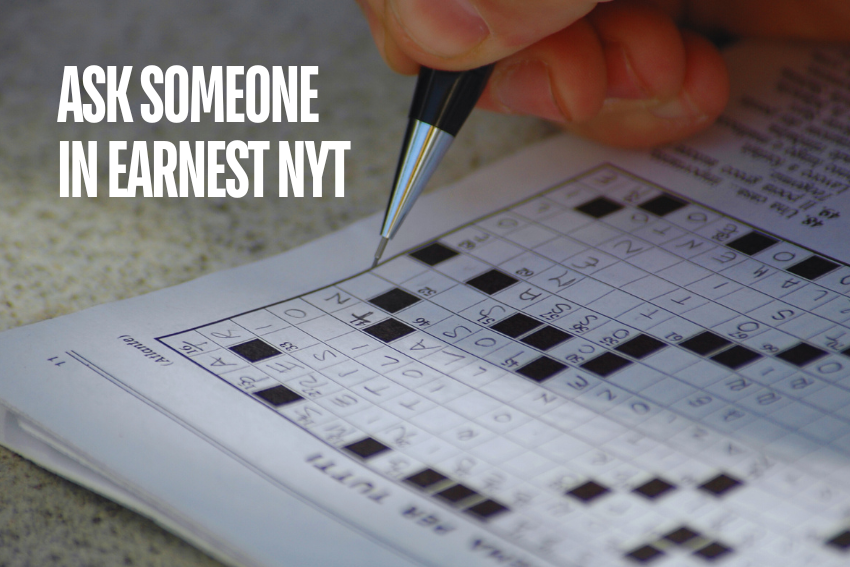Introduction to Ask Someone in Earnest NYT
Unlock the secrets of “Ask Someone in Earnest” NYT crossword clues. Explore effective strategies and tips to master your crossword puzzles.

The New York Times crossword is one of the most popular puzzles across the country. Even centuries later, people from different sections of society enjoy solving its complex word associations and elaborate clues, many of which present great difficulty even to those experienced in the field of word-play. One of the clues that has puzzled and fascinated crossword enthusiasts is the clue “Ask someone honestly”. It is therefore a perfect example of how even the simplest clues have a lot of depth.
In the following article, let’s discuss how to solve the “Ask someone honestly” clue in the NYT crossword; we will analyze its type and structure, give the regular solution, and consider possible variations, as well as offer practical tips on how to solve it. Whether you are absolutely new to crosswords or have been solving them for many years, this guide will equip you with the right strategy in tackling this difficult but entertaining crossword clue.
Understanding Crossword Clue Structures
Before we get into the typical clue process of “ask someone honestly,” crossword clues are built in a certain general format. For example, the New York Times crossword puzzles are known for using a variety of clues that challenge the mind and the solver to reason in many aspects. This means that clues can range from definitions to simple clues where the clue itself is a puzzle to be solved.
Common Clue Types:
Direct or Definition Clues: These give a direct description of the answer. However, this is relative because a given word, which matches the definition being searched for, may have several synonyms or lexeme forms.
Example: Clue: “A type of fruit” → Answer: “Apple”
Cryptic Clues: These include answers that are hidden using anagrams, word insertion, homophones, or other mechanisms of surprise. The term cryptic crossword is common in British puzzles, but The New York Times also occasionally runs cryptic puzzles.
Example: Clue: “Sounds like part of a ship” → Answer: “Bow” (homophone of “bough”)
Fill-in-the-Blank Clues: They are the explicit sluices given in the crossover and are considered a type of herald sluice because solvers use them to enter the game.
Example: Clue: “___ of the Tiger” → Answer: “Eye”
Phrase-Based Clues: These depend on recognising a phrase and an idiom and even a phrase, they sometimes confuse my child a bit as the solution lies in one and a few word plays.
Example: Clue: “Ask for the impossible” → Answer: “Moon”
Understanding of these structures will be useful in order to solve the clue “Ask Someone in Earnest” since being most probably the definition or the phrase definition type of the clue, it still may need the context to provide correct answers.
“Ask Someone in Earnest” – The Clue Breakdown
The first process can be felt while solving a crossword puzzle where the clue is something like “Ask Someone in Earnest”. The phrase itself contains two key components: “Ask” and “in Earnest.”
- “Ask”: This is so because the answer is almost in the form of verb or a word that is derived from the word ‘asking’. It shows a form of direct message or a request.
- “In Earnest”: This part of the clue is supposed to pave the way on the feelings, or the intensity of the act of asking. When someone says, “in earnest,” they are pleading something in a serious and serious way, or, in the extreme, they are begging for something.
Who to ask? If one tries to answer this question earnestly it seems most probably this is another one of those verbs that involve the usage of intensive or intensive reflexive forms where one is performing a delicate action with an explicit or implicit note of desperation. Some of these may be beg, implore, beseech, all of which may fall under the heading of serious and earnest asking.
Common Answers for “Ask Someone in Earnest”
In crosswords and particularly those made in The New York Times there are certain answers that tend to recur every time for certain clues. Of course, the same can be said about “Ask Someone in Earnest”. People over the years have come up with numerous different answers that fit this clue. In turn, below we will compare the most commonly observed solutions, as well as various interpretations of these items.
Beg (3 letters):
Most clearly and an instant answer to the clue, there cannot be any doubt. To “beg” is to ask for something in a hurried and impatient way. This word is often applied to short replies in the crossword sometimes to complete just one letter.
Example: Clue: “Ask in earnest” → Answer: “Beg”
Plead (5 letters):
A little longer this word translates as making an appeal to passion. To “plead” with someone is to ask for something in a very impassionate manner, coming to the level of appeal to feelings or reference to something valuable.
Example: Clue: “Ask sincerely” → Answer: “Plead”
Implore (7 letters):
Another formal or higher degree of formality or in terms of level, the same as “beg.” To “urge on” a person means to ask that person to do something by stating that the matter at hand is very serious. This word is longer but it is preferable when solving crosswords, as the meaning of such word is so vivid and rich.
Example: Clue: “Ask desperately” → Answer: “Implore”
Entreat (7 letters):
This is actually a less used yet a very viable verb that can be put under the same category. To ‘entreat’ is to ask, to beg in an intense manner and this is often in more formal contexts.
Example: Clue: “Ask earnestly” → Answer: “Entreat”
Beseech (7 letters):
Another formal or literary term, to “beseech” someone is to ask them fervently or desperately. This word is almost whiney and is usually applied in either historical context or drama.
Example: Clue: “Earnestly request” → Answer: “Beseech”
Request (7 letters):
While less emotionally charged than the other options, “request” can still be used to convey asking with seriousness or formality. It’s more neutral but still fits the clue depending on the context of the puzzle.
Example: Clue: “Ask formally” → Answer: “Request”
These words make up the simple search terms to input which one will use when faced with “Ask Someone in Earnest” in the NYT Crossword. However, these solutions cannot be considered conclusive — context matters most of the time; the span of the answer might provide more information.
Clue Variations and Synonyms
Crossword constructors often change the phrasing of clues to add variety and challenge to the solving experience. “Ask Someone in Earnest” may appear in different forms, all of which ultimately point to similar answers. Recognizing these variations will help solvers quickly identify the right word, even if the wording seems unfamiliar at first glance.
Variations of “Ask Someone in Earnest”:
“Ask Desperately”:
- This clue emphasizes the emotional intensity of the request, signaling a need for an answer like “implore” or “beg.”
- Example: Clue: “Ask desperately” → Answer: “Implore”
“Make an Urgent Request”:
- This version highlights the urgency rather than the emotional tone, steering solvers toward answers like “beseech” or “plead.”
- Example: Clue: “Make an urgent request” → Answer: “Beseech”
“Earnestly Request”:
- This is a more neutral phrasing that focuses on sincerity. Words like “request” or “entreat” are common answers here.
- Example: Clue: “Earnestly request” → Answer: “Entreat”
“Impressively Ask”:
- This phrasing is less common but may suggest a formal or grand request, leaning toward answers like “implore” or “beseech.”
- Example: Clue: “Impressively ask” → Answer: “Implore”
Synonyms to Watch For:
It becomes necessary to understand that there are so many related expressions to formally and seriously ask. If usual answers are needed, the majority of crosswords mostly use a limited number of them, however, NYT crosswords sometimes use less recognizable or even official language, so with this in mind, synonyms are the strongest weapon for a solver.
- Urge
- Petition
- Appeal
- Pray
- Seek
These words can often fit the clue “Ask Someone in Earnest” provided it must be typographically by a type face other than standard letters.
Tips for Solving “Ask Someone in Earnest” Clues
When you encounter the clue “Ask Someone in Earnest in a crossword puzzle, especially in the New York Times Crossword, then you will quickly discover that the answers to this clue given above can be slightly tricky to comprehend. Here are some useful tips to help you solve this type of clue with ease:
Understand the Context from Crossing Answers
The best and often the only strategy of solving the NYT Crossword is based on the intersections, so as soon as you fill in some of the neighboring squares, they will provide you with valuable letters. If you can’t solve ‘Ask Someone in Earnest’ right away the crossing answers will at least guide you towards the right path. For instance, if you have “_ M P _ O R _” then you should begin to think of words such as implore or entreat.
Crossing answers are most beneficial when you are torn between a number of potentially good answers. If options “plead” and “beg” are reasonable, then letters from the intersecting hints will cross out one of the variants in the list and help to find out what should be said.
Analyze Clue Length
By evaluating the length of the answer, one would be able to guess which of the best fits. A short clue, for example, where the answer is only 3 or 4 letters, may have an answer like ‘beg’ or ‘plea’ while where the answer is 7 letters or more may have ‘implore’ or ‘beseech’ as the answer.
The number of letters in the answer should always be counted. If the clue suggests that the answer to the mathematics word problem is a 5 letters word then the odds of this word to “beseech “will be much higher than the word “plead”. A longer word clue might take you to words which are posher such as ‘request,’ ‘plead,’ ‘urge,’ or ‘pray’.
Look for Wordplay Elements
Although the word “Ask Someone in Earnest” is quite direct, crossword clues sometimes include intelligent wordplay, even in the simplest puzzles. The word “earnest” might be the key to cracking the puzzle, as it indicates not just asking, but asking with honesty or even urgently.
For example, while “ask” and “plea” both work for “Ask Someone in Earnest,” the word “earnest” proposes a serious, more emotional appeal. This could be a word like “implore” or “beseech,” which reflect stronger emotions than the neutral “request.”
Use Crossword-Solving Tools
Although, the majority of solvers prefer to solve crossword puzzle with no assistance, the use of crossword solving aids has an added advantage when you get stuck. Ways of looking for crossword solutions include the Internet crossword solvers, word lists or pattern matching when you find yourself in a fix.
If you were able to input several letters already (for instance, “_ M P _ O _ _”), with the help of an internet crossword solver, it will easily point out “implore” as a solution. With such tools one can enhance their vocabulary and even learn how to look for patterns on crossword puzzles.
Recognize Synonyms and Variations
As far as “Ask Someone in Earnest” is concerned, one realizes that practically there are a virtually endless numbers of solutions possible if the level of a puzzler is to be kept considerable. Over time, you will start recognizing common synonyms for the clue, such as:
- Beg
- Plead
- Implore
- Beseech
- Entreat
- Appeal
By getting to know those shortcuts, you will shorten the time it takes for you to solve any puzzle. The more of them you go through, the faster these words will be lodged in your brain as possibilities.
Consider the Puzzle’s Theme or Difficulty
“In Earnest” can be asked to someone depending on the theme that is set on the Crossword puzzles. However, if the given puzzle is of the sort where the clues have an emotional or a literature orientated slant, then one may expect to find ‘beseech’ ‘entreat’ etc. However, if the puzzle is a little easier or less complex (like a Monday puzzle), then wordier phrases such as ‘beg’, or ‘plea’ might be employed.
Also, this is reminder that the NYT Crossword gets progressively challenging in the week. If early in the week, the clues may be easy such as the answer ‘beg’, then as the clues behind the puzzles more complicated, you might see answers such as ‘entreat’ or ‘implore’.
Historical Patterns of “Ask Someone in Earnest” Clues in the NYT
This practice has continued for decades and certain kinds of clues specifically, “Ask Someone in Earnest,” have become more frequent. While it’s difficult to track every instance of this clue, it’s notable that certain variations and answers have become mainstays in the crossword world.
Historical Frequency of “Ask Someone in Earnest” Clues
The words ‘beg’, ‘plead’, ‘implore’, ‘beseech’ though may no longer maintain the formal intense connotation they once had, are quite recurrent in the NYT Crossword puzzle. These answers are shorter, for example, “beg”, “plead” and are utilized mostly in the small puzzles, or it can be utilized when constructing puzzles where they have to type only the word. However, longer words such a s ‘implore’ and ‘entreat’ are likely to be used in larger, complex more difficult grid where the solver is forced to look beyond same, similar and adjacent letters.
Trends in Clue Complexity
In their original form NYT Crossword has become easier but the complexity of the clues which have been added over the years are tough. They might not have included as tough and ambiguous descriptions like in today’s crosswords do but these would surely include darker and complex descriptions. It might be called ‘Ask Someone in Earnest’ today’s constructors might place a significance or sarcasm in words or put an emotional factor to the request which solver should identify.
Fun Facts and Trivia
The clue “Ask Someone in Earnest” obviously has serious solving potential in crosswords, but its popularity is not only in it being tough to solve; it has a word itself which is rather appealing to see appear at crosswords in terms of both linguistic and cultural history.
Origins of the Phrase
Word “earnest”, which is used in the phrase “in earnest” comes for the Old English word “eornoste” which means serious, resolute, sincere. Earnestness usually relates to true feeling betrayed in prose, in speech, or, as is exemplified here, in word games. When one ‘ask in earnest’ it means that this is a really asking and not almost asking- this deep level of meaning is what makes contributing to crosswords a little invigorating.
Notable Crossword Puzzles Featuring the Clue
Some readers may have guessed this clue because some crossword puzzles include it as their central character. For example, crosswords that are linked to a topic that involves questions related to emotional language, communication, or people asking for help will have one of the clues filled in as “ask someone sincerely”. In one of the most talked about NYT crosswords, the idea of the puzzle was based on “urgent request”, so this clue is used several times in the puzzle, with the answers being “plead”, “pray”, “seek”, etc.
The solvers and constructors themselves have recognized how great crosswords look in which all the answers are linked to an emotion clue. Again, this is one of my personal favorite clues because it has many possibilities, it has many possible answers, and it gives people a way to think about language in terms of emotions and more essentially as words.
Conclusion
The following are some tips you can use to easily decipher the answers to the NYT crossword clue “Ask someone sincerely”. Deciphering the New York Times crossword is fun. Through this knowledge of the clue’s structure, knowledge of some typical solutions, and general approach to solving, you are also armed against these forms of such clues. This is where building up the whole emotional spectrum behind the clichés ‘beg’, ‘plead’, and ‘supplicate’ and an awareness of which part of it to use when solving comes in handy.
In this article, we have covered essential tips for using crossword answers, analyzing the length of clues, and taking advantage of crossword-solving tools. We also looked at how this clue evolved historically, what type of question became more frequent and complex in a given section of the NYT crossword, helping you understand how language has changed over time. Finally, we analyzed the cultural relevance of the request for honesty in terms of fun facts and the cliché’s place in pop culture, as well as the general context of this clue.
Like any such crossword clue, the best way to get better is to solve crossword puzzles consistently. The more you familiarize yourself with the possible answers and the look of the clues, you’ll increase your chances of noticing patterns in puzzles that may have been difficult. The next time you find yourself struggling in the middle trying to solve the correct answer to a clue like “Ask someone to be honest” in NYT crossword puzzles, you just go with your intuition and enjoy the thrill of solving the correct answer.





